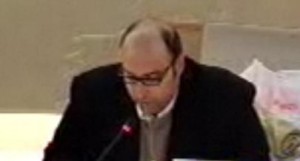 Yesterday, on March 5, 2012, the Cairo Institute for Human Rights Studies (CIHRS) delivered an oral intervention addressing the ongoing attack on civil society in Egypt before the 19th session of the Geneva-based UN Human Rights Council. The intervention came as part of an interactive dialogue between the UN Special Rapporteurs on Torture and on the Situation of Human Rights Defenders, who jointly presented their reports before states and NGOs at the Council.
Yesterday, on March 5, 2012, the Cairo Institute for Human Rights Studies (CIHRS) delivered an oral intervention addressing the ongoing attack on civil society in Egypt before the 19th session of the Geneva-based UN Human Rights Council. The intervention came as part of an interactive dialogue between the UN Special Rapporteurs on Torture and on the Situation of Human Rights Defenders, who jointly presented their reports before states and NGOs at the Council.
In its intervention, CIHRS expressed concern over the deteriorating situation of freedom of association in the country, which it viewed as “the worst crackdown since its [civil society’s] emergence in 1985.” In an attempt to sum up the crackdown in the last few months, CIHRS said that “since the Council last met in September, 17 NGO offices were raided by security forces and members of the prosecution. National and international workers in foreign human rights and democracy groups were referred to court on criminal charges in what has been known as the ‘foreign funding case.’ Hundreds of others are still awaiting their fate. Additionally, almost all national and international independent human rights organizations in Egypt are facing a severe government led smear campaign aimed at defaming them in the eyes of the public, labeling them as foreign agents aspiring to disturb public stability and divide Egypt.”
In addressing the recent developments and the suspicious manner by which the travel ban on some defendants in the “foreign funding case” were revoked, Mohamed Zaree, CIHRS Egypt Program Manager, stated: “it is truly disturbing that the judiciary is used as yet another tool by the government in its campaign against civil society. Sadly, this case happens amid rising public doubts regarding the independence of the judiciary in Egypt and reasons behind such doubts seem rather reasonable. In fact, strategies used by the authorities in this case have since the beginning been characterized by unpredictability, manipulation of facts, and complete disregard of the law.”
“It is important not to view the current vicious targeting of human rights defenders separately from the widespread and severe violations that have characterized the transitional phase in Egypt,” said Ziad Abdeltawab, CIHRS Deputy Director. “It is imperative that we recognize that this campaign, including the targeting of international democracy and human rights groups, ultimately aims to silence Egyptian human rights defenders and NGOs and prevent them from continuing their work in monitoring and documenting ongoing violations on the ground.”
During the session, several countries took the floor to comment on the Special Rapporteurs reports. The European Union expressed regret behind the targeting of journalists and media workers, most specifically in Syria, and articulated its deep concern over the crackdown on offices of NGOs in Egypt. It further asked the Special Rapporteur on the Situation of Human Rights Defenders, if she had approached the state of Egypt and inquired about this matter.
Finally, in its statements addressing the Council, the delegation of Egypt referred to human rights defenders as “partners” with the government in helping to limit human rights violations and providing the right feedback. It further admitted that rights activists play a vital role in the promotion and protection of human rights and that Egypt is currently seriously and positively examining the Special Rapportuer on the Situation of Human Rights Defenders request to visit Egypt. In this regards, it is important to mention that the Special Rapporteur had previously requested to conduct a country visit to Egypt on three different occasions.
The full text of CIHRS oral intervention is available here
Intervention’s video:
Share this Post

